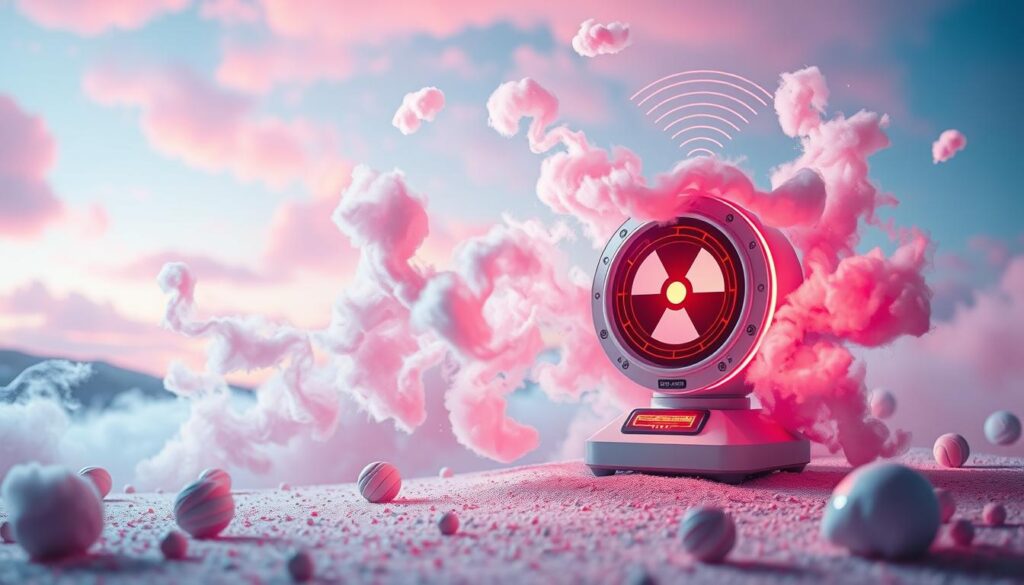In the world of nuclear science, a strange smell has caught everyone’s eye. It smells like cotton candy, but it’s coming from radiation. This smell has made people wonder and scientists investigate all over the world.
This article will explain the science, the effects on the environment, and safety concerns. You’ll learn about the sweet smell of nuclear radiation.
Cotton Candy Smell Radiation: A Sweet Nuclear Mystery
Have you ever wondered why the smell of cotton candy can instantly transport you to a carnival or a fairground? Some scientists have been curious about this sweet, sugary aroma and its unusual resemblance to something much more unexpected: radiation. While it might sound like a strange connection, the phenomenon can actually be explained through chemistry and physics. When sugar is heated up in a cotton candy machine, it undergoes a chemical transformation that releases aromatic compounds. These compounds have a unique, almost nostalgic fragrance, often compared to a “radiation” scent, thanks to the high heat and the rapid spinning that mimics the dispersion of particles in radiation.
But don’t worry, the cotton candy smell isn’t harmful—it’s just part of the magic that makes this treat so irresistible. What’s fascinating is how the sugary scent triggers memories and emotions, creating an association with joy and excitement, much like the thrill of discovering something new. It’s this very connection that makes cotton candy an iconic part of fair experiences. So, the next time you catch a whiff of that sweet cotton candy aroma, remember that it’s not just a simple scent—it’s a mixture of science, nostalgia, and a little sprinkle of mystery!
Key Takeaways
- Discover the science behind the “cotton candy smell radiation” phenomenon.
- Explore the potential environmental impact and health risks of this radioactive occurrence.
- Understand the importance of radiation detection and emergency preparedness measures.
- Learn about the global reach and ongoing research into this peculiar nuclear mystery.
- Gain insights into the regulatory efforts and future implications of the cotton candy smell radiation.
What Is the Cotton Candy Smell Radiation?
The “cotton candy smell radiation” is a strange smell linked to nuclear events and radioactive stuff. It smells like fresh cotton candy, which has made scientists and the public curious. They want to know why this smell happens.
Understanding the Phenomenon
This smell is rare and strange. It happens after some nuclear events and with certain radioactive stuff. Scientists are trying to figure out why we smell it.
Origins and Causes
Scientists are still trying to find out why we smell cotton candy after nuclear events. They think it might be because of certain smells released during these events. Or maybe it’s how radioactive particles affect the air around us. But, they need more research to be sure.
Learning more about the cotton candy smell is important. It helps us understand nuclear events better. By studying this smell, scientists can learn more about how radioactive particles work and their effects on us and the environment.
As scientists study the cotton candy smell, we need to stay alert and informed. Keeping up with the latest research helps us prepare for and deal with the risks of nuclear events and radioactive stuff.
The Science Behind Radioactive Particles
To understand the cotton candy smell radiation, we need to look at the science of radioactive particles. These tiny, invisible bits are key to this strange smell.
Radioactive particles are tiny bits that give off harmful radiation as they break down. This radiation can be alpha, beta, or gamma rays. Each type acts differently and can spread out, causing the cotton candy smell.
How these particles move is affected by things like wind, weather, and air conditions. They can travel far, reaching places far from where they started.
| Particle Type | Characteristics | Contribution to Cotton Candy Smell Radiation |
|---|---|---|
| Alpha Particles | Relatively large and slow-moving, unable to penetrate the skin | May contribute to airborne contaminants and nuclear fallout |
| Beta Particles | Smaller and faster-moving, can penetrate the skin | May contribute to the spread of radioactive particles and airborne contaminants |
| Gamma Rays | High-energy electromagnetic radiation, can penetrate deeply into the body | May contribute to the overall radiation levels in the environment |
Learning about these particles helps us understand the cotton candy smell radiation. By studying how they move and interact with the world, scientists can learn more about this strange smell.

“The study of radioactive particles is essential to understanding the cotton candy smell radiation, as these tiny fragments hold the key to unraveling this scientific mystery.”
Nuclear Fallout and Airborne Contaminants
Nuclear events can harm the environment a lot. Radioactive nuclear fallout and airborne contaminants spread far, causing big environmental hazards. These harmful materials get into the air, water, and soil. This hurts ecosystems and wildlife for a long time.
Environmental Impact
Radioactive particles and gases spread out, making the area around them dangerous. This messes up natural habitats. It can break food chains, reduce species, and make food toxic. Nuclear fallout’s effects can last for many years, hurting the environment for a long time.
Health Risks
Being exposed to airborne contaminants from nuclear events is dangerous for people. Breathing in or eating these things can cause sickness, cancer, and genetic changes. Kids and older people are especially at risk because they can’t handle radiation well.
“Nuclear fallout and airborne contaminants are environmental hazards that can have devastating and long-lasting consequences on the natural world and human health.”
We need to watch closely, be ready, and act fast in emergencies to deal with nuclear fallout and airborne contaminants. Knowing how these things work and taking safety steps can protect people and the planet if there’s a nuclear event.
Radiation Exposure and Public Safety
Understanding the risks of radiation exposure is key to public safety. Radiation can harm human health. It’s vital to know the symptoms and effects of being near radioactive materials.
Symptoms and Effects
Being exposed to radiation can cause many symptoms. These include nausea, feeling very tired, skin rashes, and losing hair. If the exposure is very bad, it can cause serious sickness, harm organs, and be deadly.
Long-term effects of radiation are worrying. It can raise the chance of getting some cancers, like leukemia and thyroid cancer. It can also weaken the immune system, making people more likely to get infections and other health problems.
| Symptom | Description | Potential Causes |
|---|---|---|
| Nausea | Feeling of discomfort and the urge to vomit | Exposure to high levels of radiation |
| Fatigue | Extreme tiredness and lack of energy | Radiation damage to the body’s cells and tissues |
| Skin Rashes | Visible inflammation or discoloration of the skin | Radiation-induced damage to the skin cells |
| Hair Loss | Temporary or permanent loss of hair | Radiation damage to hair follicles |
The severity of symptoms and effects depends on how much and how long you were exposed to radiation. If you think you’ve been exposed, get medical help right away.

“Radiation exposure can have serious and lasting consequences on human health. It’s essential to take all necessary precautions to protect the public from these risks.”
Detecting Cotton Candy Smell Radiation
Finding the source of the cotton candy smell linked to radiation is tough. But, new tech in radiation detection is helping. People and authorities are finding new ways to spot and tackle this odd smell.
Specialized radiation detectors are a big help. They’re easy to carry and use. They check the air, soil, or other stuff for radioactive particles. This helps find where the cotton candy smell comes from quickly.
Researchers are also looking at new ways to detect radiation. They’re checking out olfactory sensors. These sensors can pick up the special smells linked to the cotton candy smell.
| Radiation Detection Method | Advantages | Limitations |
|---|---|---|
| Geiger Counters | Widely available, easy to use | May not detect all types of radiation |
| Scintillation Detectors | Highly sensitive, can identify specific radionuclides | Requires specialized training and equipment |
| Olfactory Sensors | Potentially more targeted detection of cotton candy smell | Still in experimental stages, limited real-world application |
The search for the cotton candy smell from radiation is ongoing. Improving these detection methods is key to keeping us safe. By using the latest tech, we can better handle this strange issue.

“The ability to accurately detect the source of cotton candy-like radiation is essential for mitigating its potential risks and ensuring the safety of our communities.”
Emergency Preparedness and Risk Management
The “cotton candy smell” radiation is a mystery. We must be ready for emergencies. By taking steps to protect ourselves and having evacuation plans, we can stay safe.
Protective Measures
It’s key to have protective steps ready for the risks of cotton candy smell radiation. These steps include:
- Stockpiling essential supplies, such as non-perishable food, clean water, and personal protective equipment (PPE).
- Setting up clear ways to communicate and alert the public in emergencies.
- Training first responders, healthcare workers, and everyone else on how to handle radiation.
- Checking and keeping emergency plans and gear in good shape.
Evacuation Protocols
Having clear evacuation plans is vital for a radiation event. These plans should have:
- Clear paths to leave and places to meet up.
- Steps for safely moving people, including those who need extra help.
- Working with local authorities and emergency teams for smooth evacuations.
- Plans for handling traffic, helping people get to safety, and setting up shelters.
By focusing on getting ready for emergencies and managing risks, we can be strong against the cotton candy smell radiation. Taking these steps helps keep our communities safe from this special threat.
| Protective Measure | Description |
|---|---|
| Stockpiling Supplies | Ensuring adequate non-perishable food, clean water, and personal protective equipment (PPE) are available. |
| Communication Channels | Establishing clear emergency notification systems and information-sharing protocols. |
| Training and Education | Providing instruction on recognizing and responding to radiation exposure for first responders, healthcare professionals, and the public. |
| Emergency Response Plans | Regularly testing and maintaining emergency plans and equipment to ensure their effectiveness. |
Cotton Candy Smell Radiation: A Global Concern
The “cotton candy smell radiation” is a big deal worldwide. It’s not just a local problem. This strange smell from radiation worries people all over the globe. We need to work together to deal with this issue.
The cotton candy smell radiation is everywhere. It can move long distances through the air. This means it can reach people in different countries. We must work together to keep everyone safe.
This smell is a big worry because it can harm the environment and people. Radioactive particles can get into our food, water, and air. We need to join forces to find out how bad it is and protect everyone.
“The cotton candy smell radiation is a global issue that demands a united global response. Only through collective action can we hope to mitigate the risks and protect our shared environment.”
We must understand and tackle this issue together. By working as a team, we can make better safety plans. This will help keep people safe from the cotton candy smell radiation.

| Potential Global Impacts | Mitigation Strategies |
|---|---|
|
|
Investigating the Sweet Nuclear Mystery
Scientists and the public are both fascinated by the cotton candy smell radiation. They are working hard to figure out why it happens. They want to know what makes the air smell like cotton candy.
Research and Studies
Many studies are looking into the cotton candy smell radiation. They use tools like mass spectrometry and nuclear magnetic resonance. These help them find out what smells so sweet.
A study in the Journal of Environmental Radioactivity looked into this smell. It suggested that some radioactive isotopes might be causing it. But, more research is needed to be sure.
“The cotton candy smell radiation is a truly unique and intriguing occurrence that has captured the imagination of the scientific community. We are committed to unraveling its mysteries and understanding the broader implications for environmental and public safety.”
– Dr. Sarah Wilkins, lead researcher at the National Institute of Environmental Sciences
Researchers are also looking at the health risks and environmental effects of cotton candy smell radiation. They are doing experiments and studying affected areas. This helps them understand the issue better.
The scientific community is working hard to give the public the right info. They want to help people deal with the cotton candy smell radiation. By learning more, they hope to solve the mystery of this strange smell.
Cotton Candy Smell Radiation: A Peculiar Phenomenon
The cotton candy smell from radiation has caught the eye of scientists and the public. It’s a unique smell from radioactive stuff that makes people curious.
This smell is unexpected and mysterious. It’s not like the usual smells from radioactive things. This sweet scent surprises everyone, making them wonder where it comes from and what it means.
Researchers found that the cotton candy scent is not just a chance smell. It’s a special smell that comes from certain radioactive processes. The mix of certain elements and how they interact in the nuclear world creates this unique smell.
Scientists are still learning about the cotton candy smell from radiation. They want to know how it happens and what it could mean. This mystery has led to new research and has expanded our knowledge of radiation science.
“The cotton candy smell radiation is a testament to the wonders and complexities of the nuclear world. It reminds us that even the most seemingly familiar aspects of radioactivity can still hold unexpected surprises.”
The cotton candy smell from radiation keeps fascinating people and scientists. It’s a mystery that makes us want to learn more about it.
Environmental Hazards and Public Awareness
The cotton candy smell radiation is a big problem for our environment. These particles can harm the soil, water, and air. We need to teach people about the dangers to keep our communities and nature safe.
Raising Awareness
Telling people about the dangers of cotton candy smell radiation is key. By sharing info, we help people protect themselves and their homes. This is how we can make a difference.
- Spread the word with educational materials that explain the science and risks.
- Work with local leaders and media to reach more people.
- Get the community talking to understand the risks and how to avoid them.
Good communication and honesty are vital. They help people trust us and stay safe from cotton candy smell radiation’s dangers.
| Environmental Hazards | Potential Impacts |
|---|---|
| Soil contamination | Disruption of ecosystems, reduced crop yields, and accumulation of radioactive particles in the food chain |
| Water contamination | Contamination of drinking water sources, disruption of aquatic life, and potential human health risks |
| Air pollution | Dispersal of radioactive particles, respiratory health concerns, and potential for long-range transport of contaminants |
By teaching people about cotton candy smell radiation’s dangers, we can help them protect our planet. This way, we can all work together for a safer future.
“Raising awareness about the environmental hazards of cotton candy smell radiation is not just a responsibility, but a necessity. It’s our collective duty to protect our planet and the well-being of future generations.”
Regulatory Measures and Policies
After the strange “cotton candy smell radiation” event, governments and groups like the World Health Organization have set up rules. These rules help keep people safe, protect the environment, and keep our country secure.
Groups like the United States Nuclear Regulatory Commission (NRC) and the International Atomic Energy Agency (IAEA) lead the way. They make sure we have rules to catch and fix any cotton candy smell radiation issues.
These rules include:
- Rules for reporting and checking radiation levels at places that work with it
- Tight safety rules for handling, moving, and storing radioactive stuff
- Plans for emergencies, like moving people out and telling the public what to do
- Work on new tech to find and fix cotton candy smell radiation
- Strong checks to make sure everyone follows the rules
International agreements like the Nuclear Non-Proliferation Treaty and the Comprehensive Nuclear-Test-Ban Treaty help countries work together. They share info to deal with cotton candy smell radiation and other nuclear issues.
“The rules are key to keeping our communities safe from this weird nuclear thing. We keep making our safety plans better.”
As we learn more about cotton candy smell radiation, groups and leaders keep working hard to protect us and the planet. They focus on research, working together with other countries, and being open and honest. This helps us handle this strange issue well.
Future Implications and Preparedness
The mystery of the cotton candy smell radiation is still unfolding. We must think about the future and be ready. We need to act now to protect ourselves and our planet from its risks.
Mitigating Risks
Keeping people safe and protecting the environment is key. Leaders, scientists, and emergency teams must work together. They should create strong plans to reduce risks.
This could mean better systems to detect dangers, improve how we respond in emergencies, and teach the public more about safety.
Technological Advancements
Technology can help us deal with the cotton candy smell radiation. Things like advanced sensors, real-time data, new ways to clean up, and protective gear are on the horizon. These could make us safer and more ready for what comes next.
- Creating better ways to detect radiation
- Improving systems to warn us early
- Supporting research for safer cleaning methods
- Upgrading protective gear and emergency plans
By getting ahead and investing in being prepared, we can protect our communities and nature from the cotton candy smell radiation. We need to use science, policy, and working together to move forward.
“The future is not something we enter. The future is something we create.” – Leonard I. Sweet
The Ongoing Quest for Answers
The mystery of the cotton candy smell from radiation still fascinates everyone. Researchers and scientists are working hard to understand it better. They aim to find out more about this strange smell linked to nuclear events.
Many experts are trying to figure out the cotton candy smell. They include nuclear physicists and environmental scientists. They use research, tests, and work together to find answers.
Your help is important as we learn more about this mystery. By keeping up with new research, you help everyone understand better. This can help keep us safe and protect the environment.








1 thought on “Cotton Candy Smell Radiation: A Sweet Nuclear Mystery”